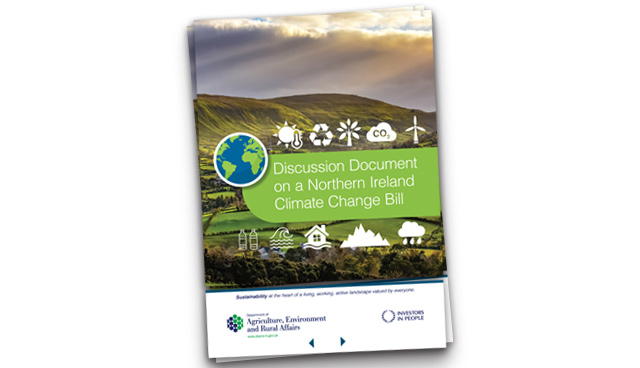Towards a Climate Change Act

The Department of Agriculture, Environment and Rural Affairs is to gauge public opinion on whether it should aim for net zero carbon emissions by 2050 or the 82 per cent reduction recommended by the UK’s Climate Change Committee (CCC).
The two options form the basis of the public discussion document launched by the Department in December in preparation for the first climate-specific legislation for Northern Ireland.
The consultation was launched around the same time the UK Government’s advisory body responded to the Minister Edwin Poots’s request for an assessment of Northern Ireland’s required contribution to the UK’s net zero carbon by 2050 target.
The CCC has indicated its belief that an 82 per cent reduction in all greenhouse gases in Northern Ireland “represents equivalent effort and a fair contribution to the UK net zero target”.
The two options set out in the consultation are for a:
- Northern Ireland Climate Change Bill setting interim emission reduction targets and a long-term target of net zero emissions in Northern Ireland by 2050 (long-term target does not consider expert climate change advice); or
- Northern Ireland Climate Change Bill setting interim emission reduction targets and a long-term target for Northern Ireland by 2050, the long-term target is an equitable contribution to achieving UK-wide net zero by 2050 (long-term target considers expert climate change advice).
In Northern Ireland, greenhouse gases have reduced by around 20 per cent since 1990 levels largely driven by progress in the energy sector through the generation of renewable electricity via onshore wind technology. However little progress has been made in the largest emitting areas of agriculture (27 per cent) and transport (23 per cent).
Northern Ireland does not have specific climate change legislation; however, the UK Climate Change Act 2008 extends to Northern Ireland, which accounts for around 4.3 per cent of UK GHG emissions.
At the beginning of 2020, the New Decade New Approach deal to restore the Northern Ireland and Executive and agreed by all five main parties, pledged to bring forward a Climate Change Act to give environmental targets a strong legal underpinning. In February, the Assembly followed the UK’s decision in 2019 and declared a climate emergency.
On 21 July 2020, the Northern Ireland Assembly passed a motion on the introduction of a Climate Change Act within three months. Around the same time Minister Poots had said that officials in his department did not accept the terminology “climate crisis” or “climate emergency”. However, following criticism, the Minister received an apology from his Permanent Secretary for the briefing he was given and Poots
has accepted that there is a climate crisis.
However, he described the three-month timeframe to introduce legislation as “impossible”, stating that he was committed to action and not words.
In response, Green Party leader Clare Bailey submitted a Climate Change Bill to the Assembly in October which she said had cross-party and cross-community support.
The Discussion Document on a Northern Ireland Climate Change Bill is open until 1 February.
“Climate change is a defining issue of our time on a global and national scale,” said Poots.
“It is vital that Northern Ireland’s climate change legislation is well informed and based on sound evidence and science. Climate change effects everyone, and everyone in Northern should have their say in what climate change legislation for Northern Ireland should look like. Now is the time to act and it is crucial that we do all that we can to protect our planet and secure a greener cleaner future for both current and future generations to come, and a Northern Ireland Bill is a step in the right direction.”





